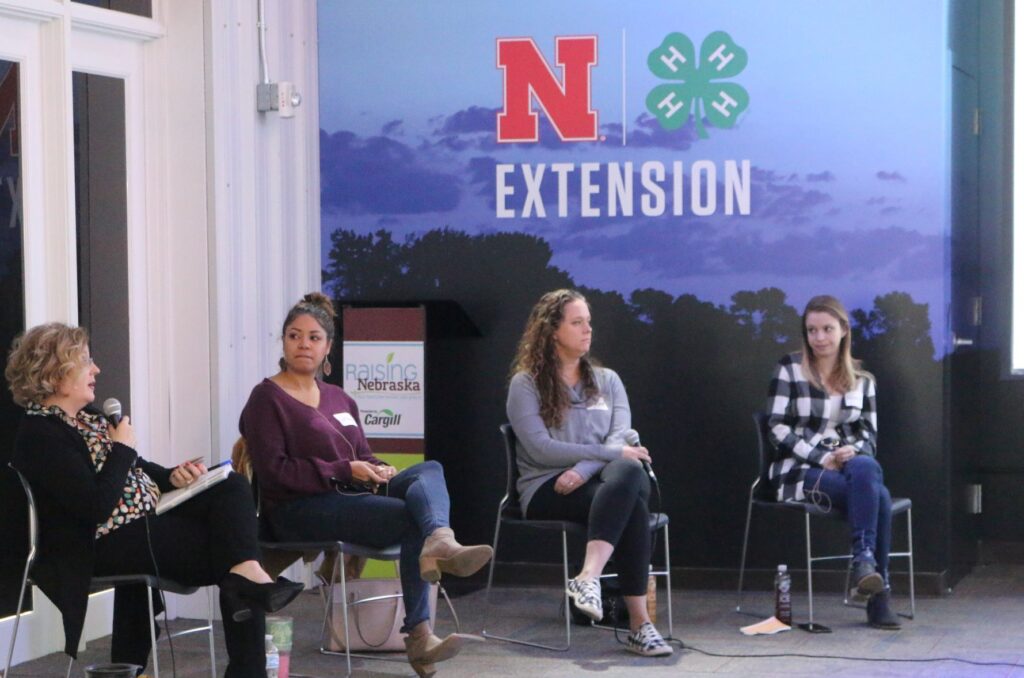What happens when you put food-conscious consumers center stage and ask them questions about food and how it’s produced?
Nebraska CommonGround, part of a national movement of farm women sharing information about farming and food to help earn trust, hosted a consumer panel in Grand Island, Neb., supported by Nebraska Corn Board and Nebraska Soybean Board. The volunteers had the opportunity to hear straight from the source about some of the hottest topics affecting the food system today.
Facilitated by Allyson Perry with The Center for Food Integrity, the panel gave audience members a chance not only to listen, but to ask questions to learn more about what’s most important to consumers as they make food choices for themselves and their families.
The conversation shed light on some important topics including food labels, accountability, technology and lab-grown meat.
Gene Editing: Plants, Yes. Animals, Not So Sure
Reflecting findings from recent CFI research on consumer acceptance and rejection of technology in food production, one panelist said she’d support gene editing in plants over gene editing in animals.
Listen in: Do You Trust Gene Editing?
Sustainability: At What Price?
While sustainability is more important to consumers than ever before, the panel wasn’t sold on technology that can make food production more sustainable. There was concern about long-term impacts and they felt that more information was needed to make an informed decision.
Listen in: Would you be in favor of technology if it made food more sustainable?
The Confidence Factor
When asked what would make them most confident in food choices, panelists voiced support for third-party verification – outsiders looking in to make sure farmers are doing things right.
Listen in: What would make you feel more confident in the food that you purchase?
Cautious about Cultured Meat
Cultivated or cultured meat, real animal products made in labs and commercial production facilities, were not a panel favorite. While some were open to at least trying it, most were skeptical and felt it wasn’t something they’d be comfortable consuming.
Listen in: Are you comfortable eating cultivated (cultured) meat?
Labels
When the panel was asked which labels made them feel better about their food purchases, answers varied. When asked how much more they’d be willing to pay, the answers ranged from 25 to 50 percent more. As one respondent put it, regarding free-range chickens, the label “makes us feel good about how the chickens are being raised. They get to have a life.”
Listen in: Which labels make you feel good about the food you buy?
Lessons Learned
While insightful, CFI consumer panels can prove challenging for ag audiences when comments reflect misinformation. However, long-time Nebraska CommonGround member Joan Ruskamp said she appreciates the honesty as there’s an opportunity to dialogue about her own experiences.
“If an environment provides safety to express ideas because we are willing to listen and respectfully have the conversation, then we all win,” said Ruskamp, who farms with her husband near Dodge, Neb., growing row crops and feeding cattle for beef.
“I like to hear from consumer panels, especially as we go through the COVID pandemic, to learn what changes in food purchases have occurred, what drove those changes and what the new challenges are,” she said.
Ruskamp’s advice for others in agriculture about engaging with consumers?
See consumers as your friend, your family member, a community member who has legitimate concerns and questions about agriculture. Then, offer an inviting attitude to listen to concerns, connect on shared values and respond with your story and experiences.
“Focus on staying with the consumer and do not let the issue come between you,” she said. “Rather, look at staying on one side of the fence with the consumer and keeping the problem on the other side.”
Do you really know what consumers think and how their attitudes, fears and purchasing behaviors are shaped? Consider one of CFI’s popular consumer panels for your next event. Contact Vicki Landtiser.

